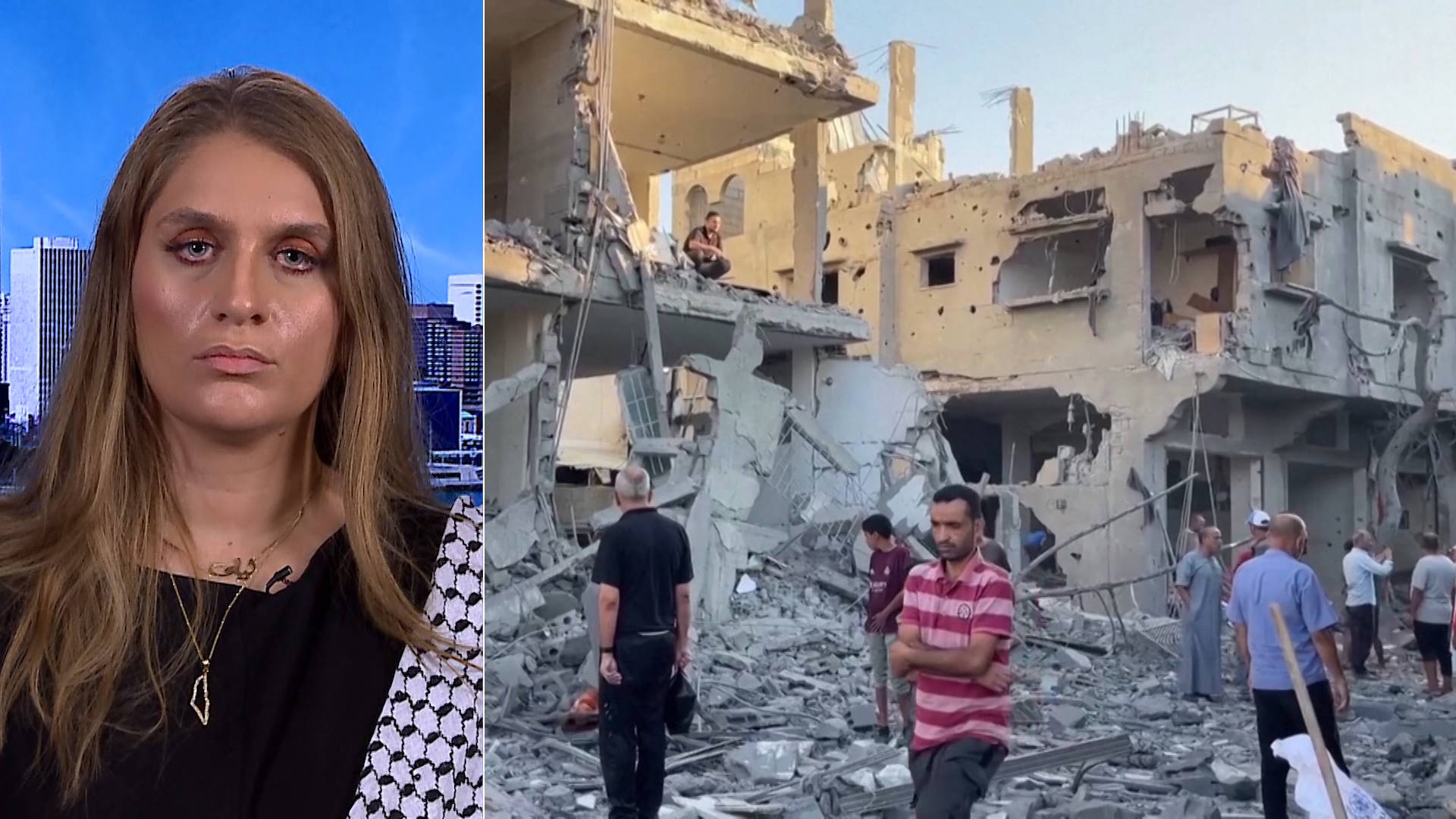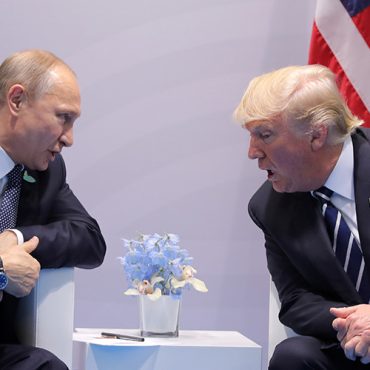This is a rush transcript. Copy may not be in its final form.
AMY GOODMAN: This is Democracy Now!, democracynow.org. This is “War, Peace and the Presidency.” I’m Amy Goodman.
With more than 40,000 Palestinians dead and fears of an escalating regional war, Qatar, Egypt and the U.S. issued a joint statement Thursday calling on Israel and Hamas to reach a ceasefire in Gaza. They called to, quote, “resume urgent discussion” on August 15th in Doha or Cairo to, quote, “close all remaining gaps and commence implementation of the deal without further delay,” unquote.
This comes as Vice President Kamala Harris is facing pressure to define her platform on Palestine as the Democratic presidential nominee. On the campaign trail Wednesday, Harris and her vice-presidential running mate, Minnesota Governor Tim Walz, spoke in Michigan, where more than 100,000 people cast “uncommitted” protest votes against Biden earlier this year in Michigan’s primary election. At a rally in Detroit, Palestinian rights protesters disrupted Harris during her speech.
VICE PRESIDENT KAMALA HARRIS: He intends to end the Affordable Care Act. You know what? If you want Donald Trump to win, then say that; otherwise, I’m speaking.
AMY GOODMAN: Before the rally, Harris had a short exchange with two leaders of the Uncommitted National Movement, who called for an arms embargo on Israel. Also Wednesday, Harris won the backing of the highest-ranking Arab American official in Michigan’s largest county, Wayne County. Assad Turfe told the Associated Press he, too, met with Harris and pressed for a ceasefire and that she, quote, “gives us the best chance of achieving peace in that region moving forward,” unquote.
Meanwhile, Harris’s national security adviser later wrote on X, quote, “@VP has been clear: she will always ensure Israel is able to defend itself against Iran and Iran-backed terrorist groups. She does not support an arms embargo on Israel. She will continue to work to protect civilians in Gaza and to uphold international humanitarian law,” unquote.
For more, we’re joined in Southfield, Michigan, by one of the people who met with Vice President Harris. Layla Elabed is the co-chair of the Uncommitted National Movement.
Layla, welcome back to Democracy Now! You briefly spoke with the presidential candidate, Vice President Harris, on Wednesday before she addressed that crowd where she was interrupted by Palestinian solidarity protesters. Can you talk about where you were when you talked to her and what you said?
LAYLA ELABED: Yes. Thank you, Amy, for having me on.
When Abbas Alawieh and I had this moment to have a brief exchange with Vice President Harris and Governor Tim Walz, we were kind of backstage of the rally in a photo lineup. And it was just a very brief exchange. And I can go in a little bit more detail of, you know, what was said, what I said. In my exchange with her, I got very emotional. I told her, “My name is Layla. I’m Palestinian.” And in that moment, I was thinking about my community. I was thinking about the two community members I had just spoken to the day prior, who told me they had lost over a hundred members of their family each in Gaza. And I told Vice President Harris that. I told her that. I said, “Right now Michigan voters want to support you, but we need a policy change that is going to save lives in Gaza right now. My community members are losing tens to hundreds of their family members. Will you talk to me about an arms embargo? Will you talk to Uncommitted about an arms embargo? Will you meet with us?” And she said, yes, she would meet with us.
And so, I did feel — you know, I was very emotional in that brief exchange. I did feel like her sympathy and empathy towards me was very genuine. But Palestinian children cannot eat words. We need more than sympathy or empathy. We need action. And we know that Kamala Harris’s stance right now is not an arms embargo. We know that the policy of the White House is not an arms embargo, which is why we asked her if she would meet with us to talk about an arms embargo.
AMY GOODMAN: So, what did she tell you in that brief meeting? And in that meeting, did you call for a further meeting? And what was your response to what she said to the protesters as they chanted?
LAYLA ELABED: In that brief, very brief exchange — I mean, it was only just a few minutes long — like I said, I was very emotional. And I was facing directly towards Vice President Harris. And, you know, she was very comforting. She was very sympathetic and empathetic. And she nodded to what I — everything that I was saying. You know, when I mentioned that our community members are losing tens of hundreds of their family members, she said, “It’s horrific.” And when I said, “Will you meet with us to talk about an arms embargo?” she said, “Yes, we’ll meet with you,” and directed me towards some of her staff, that we later on got to briefly exchange so we can have this open window or open door to figure out, you know, what are the next steps to actually having an official sit-down meeting.
And my response — you know, I know shortly after that, she went on stage. I was not at the rally. Abbas Alawieh and I were not at the rally. And so, we heard later her response to those protesters. And I wish her response was one that she led with compassion. I wish that she had addressed those protesters who are advocating for human rights differently, because that is what these protesters are advocating. They are advocating that their loved ones, their family members, people that look like us, people that share a common language and culture, end this subjugation of violence against them. And they want to be heard.
AMY GOODMAN: Let me ask you your assessment of the Minnesota Governor Tim Walz, who is the vice-presidential running mate of Kamala Harris, what he has to say about the uncommitted movement that you’re co-chair of, Layla.
LAYLA ELABED: Yes. I know during the presidential primaries that Governor Walz went on mainstream TV and said, you know, “These are Democrats. These are voters who want to be listened to. Maybe we should listen to them.” So, you know, I do appreciate that that is the point of view that he is coming from. And that is exactly what our movement and voters of uncommitted want, is we want to be listened to. We demand to be listened to, because right now the current Gaza policy is a immoral and unpopular policy.
AMY GOODMAN: Finally, could you see yourself voting for Harris and Walz? What would it take?
LAYLA ELABED: Right now we need a policy change that will save lives. Until that happens, I don’t see Michigan voters coming to support Vice President Kamala Harris and Tim Walz in the general election. We are demanding that this collective punishment of Palestinians end. We need a policy change that will protect our family members, our loved ones and our people in Gaza right now. And, you know, we want [an end to] this unconditional, unchecked flow of weapons funding with our American taxpayer dollars going to a far-right-wing government.
AMY GOODMAN: Layla Elabed, I want to thank you very much for being with us, co-chair of the Uncommitted National Movement and also sister of Congressmember Rashida Tlaib.
Next up, press freedom groups express alarm over felony hate crime charges brought against an accredited photojournalist in New York. Back in 20 seconds.











Post comments (0)